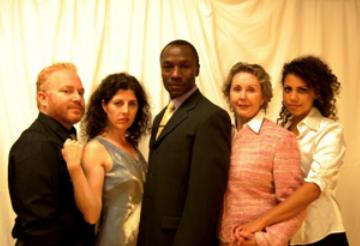While it took the American Pie franchise to bring “MILF” into our cultural vocabulary, on a biological level the connection between motherhood and sexuality has always existed. When theatre director Adam Seelig began work on Like the First Time, this relationship was at the forefront of his mind.
“We have a sort of cultural blind spot about this,” Seelig says. “But there’s no getting around it. Children are the product of sex, and women who have children have sex.”
Centred on Fulvia (Cathy Murphy), a woman torn between two lives, the production serves as an allegory for this cultural disconnect. On one hand she has Marco (Dov Mickelson), a lover who gives sexual satisfaction without any commitment. On the other is Sylvio (Andrew Moodie), the husband she left 13 years earlier, who’s trying to woo her back.
When Fulvia left the marriage, she also left behind a daughter, Livia (Jessica Salgueiro), and an aunt, Ernestina (Elva Mai Hoover), a maternal figure who wants what’s best for Fulvia. Fulvia has not had contact with her daughter since she left the marriage shortly after Livia was born.
“I came to the script as a fairly new parent, so the idea of abandoning your own flesh and blood and forging a totally new identity had a fascinating and chilling tone,” Seelig says. “One of the things you learn from children is how they see through bullshit immediately. They have an ability to bring out the truth and can’t abide dishonesty. So much of the energy in the piece comes from that younger character.”
The work is based on Italian writer Luigi Pirandello’s Come Prima Meglio di Prima (Like Before, Better than Before), a 1920 play the Stanford-educated theatre nerd first stumbled on five years ago. Though he was struck by its themes, he found certain elements cumbersome, particularly the additional 10 characters. Working from the original Italian script with a translator, he waded through the text, isolating essential plot points and people, distilling it to its essence. When it came time to create his own adaptation, he took an approach atypical of modern writers: he wrote the entire thing by hand.
“It’s not intended to sound like a revolutionary approach, but just about every writer working today is using a computer,” he says. “I find there’s a greater fluidity and a stronger connection to the text when writing by hand. It slows me down and gives me pause to think. It’s also great for concentration, because you don’t have the internet lurking at the edge of your desktop.”
The text was eventually translated to a digital form, but Seelig maintained his original formatting. At first glance, the current script looks like words sprinkled on the page, without punctuation or reason, providing a potential hurdle for actors, both in memorizing and interpreting what’s written.
“It’s a little ass-backward because usually you can look at a text and realize immediately what’s being said,” he says. “With this style of writing, you often don’t know what you’ve said until you’re done saying it. In that sense, it’s closer to regular speech.”
Though he’s still determining how the text translates to physical action on stage (he doesn’t yet know how sexually explicit the performance will be), Seelig is clear on one thing.
“At the core of this piece, we’re examining the struggle a lot of women experience on a daily basis,” he says. “The desire for independence and a sexually energetic life, and how that can often be hampered by domesticity and the realities of raising a family. The play suggests that the main character may be living a more honest and true life through her double persona, rather than following the singular path society has constructed for her.”
The Deets:
Like the First Time opens Fri, Oct 28 and runs to Sun, Nov 13
Tuesdays-Saturdays at 8pm, Sundays at 2pm
Walmer Centre Theatre, 188 Lowther Ave
onelittlegoat.org.


 Why you can trust Xtra
Why you can trust Xtra


